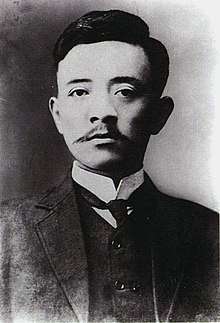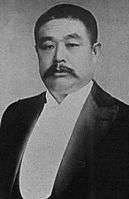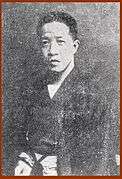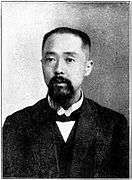1912 Republic of China National Assembly election
The 1912 Republic of China National Assembly elections, held in December 1912 to January 1913, were the first elections for the new founded Republic of China Senate and House of Representatives.
| |||||||||||||||||||||||||||||||||||
All 870 seats in the National Assembly (274 seats in the Senate and 596 seats in the House of Representatives) | |||||||||||||||||||||||||||||||||||
|---|---|---|---|---|---|---|---|---|---|---|---|---|---|---|---|---|---|---|---|---|---|---|---|---|---|---|---|---|---|---|---|---|---|---|---|
| |||||||||||||||||||||||||||||||||||
| |||||||||||||||||||||||||||||||||||
Overview
The poll was indirect as voters chose some 30,000 electors who chose about 2,000 members of the provincial assemblies and 596 members of the House of Representatives. This system caused instances of bribery.
The 274-member Senate was elected by the provincial assemblies which had themselves been elected in 1909 during the Qing dynasty.
Adult males over the age of 21, who were educated or owned property and paid taxes, and who could prove two-year residency in a particular county could vote.[1] An estimated 40 million, 4-6% of China's population were registered for the election.[2] This is an increase from the size of the electorate in the 1909 Chinese provincial elections, when less than 1% of the population was enfranchised.
The president had to pick the 64 members representing Tibet, Outer Mongolia, and Overseas Chinese due to the fact that the government in Beijing did not exercise enough control over these populations to organize elections.
Despite the compromises, this election had the participation of over 300 civic groups and was the first and most competitive nationwide election in Chinese history.
The Nationalist Party (Kuomintang) led by Song Jiaoren won a plurality in both houses of the assembly and expected to become the Premier.[2] After losing the election, the Republican, Unity, and Democratic (formerly Constitutionalist) parties merged into the Progressive Party with Liang Qichao as leader. The Progressive Party became the main rival to the Nationalists.
Song was assassinated on 20 March 1913. When the assembly convened for the first time on April 8 amid heated debate over the assassination, the Nationalists were divided over solutions on how to deal with Yuan Shikai, the provisional president who was suspected of the crime. On 12 July, Sun Yat-sen led a faction into rebellion against Yuan. However, the Second Revolution but was completely defeated within two months.
The National Assembly members were compromised by threats and bribes from Yuan. He confined them and forced them to elect him formal president in the October presidential election. Next, he outlawed the Nationalists and expelled them from the assembly. Without a quorum, it could not convene so Yuan disbanded it on 10 January 1914.
Voter and membership statistics
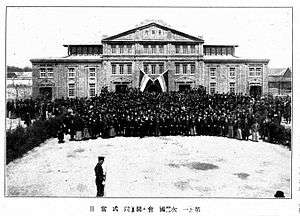
| Province | Population | Voters | % | House Members | Senate Members |
|---|---|---|---|---|---|
| Chihli | 25,932,133 | 9,195,757 | 35.46 | 46 | 10 |
| Fengtian | 12,133,303 | 896,408 | 7.39 | 16 | 10 |
| Kiren | 5,580,030 | 108,835 | 1.95 | 10 | 10 |
| Heilungkiang | 2,028,776 | 288,234 | 14.21 | 10 | 10 |
| Kiangsu | 32,282,781 | 1,939,386 | 6.01 | 40 | 10 |
| Anhwei | 16,229,052 | 1,450,901 | 8.94 | 27 | 10 |
| Kiangsi | 23,987,317 | 4,986,883 | 20.79 | 35 | 10 |
| Chekiang | 21,440,151 | 1,184,629 | 5.53 | 38 | 10 |
| Fukien | 15,849,296 | 1,283,348 | 8.10 | 24 | 10 |
| Hupeh | 25,590,308 | 5,670,370 | 22.16 | 26 | 10 |
| Hunan | 27,390,230 | 1,277,414 | 4.66 | 27 | 10 |
| Shantung | 30,987,853 | 1,368,184 | 4.42 | 33 | 10 |
| Honan | 35,900,038 | 1,688,632 | 4.70 | 32 | 10 |
| Shansi | 12,269,386 | 2,588,068 | 21.10 | 28 | 10 |
| Shensi | 10,271,096 | 1,395,622 | 2.98 | 21 | 10 |
| Kansu | 4,989,907 | 148,526 | 2.98 | 14 | 10 |
| Szechwan | 48,129,596 | 1,729,368 | 3.59 | 35 | 10 |
| Kwantung | 28,010,560 | 1,966,516 | 7.02 | 30 | 10 |
| Kwangsi | 8,746,747 | 2,731,717 | 31.23 | 19 | 10 |
| Yunnan | 9,466,965 | 233,398 | 8.20 | 22 | 10 |
| Kweichow | 9,665,227 | 792,290 | 8.20 | 13 | 10 |
| Sinkiang | 2,000,000 | 9,506 | 0.48 | 10 | 10 |
| Mongolia & Tsinghai | - | - | - | 30 | 30 |
| Tibet | - | - | - | 10 | 10 |
| Oversea Chinese | - | - | - | - | 6 |
| Central Society | - | - | - | - | 8 |
| Total | 406,880,486 | 42,933,992 | 10.50 | 596 | 274 |
Results
| Party | Senate | House | Total seats |
Seat % | |
|---|---|---|---|---|---|
| Nationalist Party | 132 | 269 | 392 | 45.06 | |
| Republican Party | 46 | 120 | 175 | 20.11 | |
| Unity Party | 6 | 18 | 24 | 2.76 | |
| Democratic Party | 8 | 16 | 24 | 2.76 | |
| Multi-party candidates | 38 | 147 | 185 | 21.26 | |
| Nonpartisan | 44 | 26 | 70 | 8.05 | |
| Totals | 274 | 596 | 870 | 100 | |
See also
- 1909 Chinese provincial elections
- History of the Republic of China
- National Assembly of the Republic of China
- History of the Kuomintang
- Progressive Party of China
- History of Beijing
References
- Cambridge History of China, Vol 12, Part 1: 222-223
- Young, Ernest P. ""Politics in the Aftermath of Revolution: The Era of Yuan Shih-K'ai, 1912-16"". Cambridge History of China, Vol 12, Part 1. p. 222.
Bibliography
- Twitchett, Denis; Fairbank, John K, eds. (1983). The Cambridge History of China. Volume 12, Part 1. Cambridge University Press. ISBN 978-0-521-23541-9.
